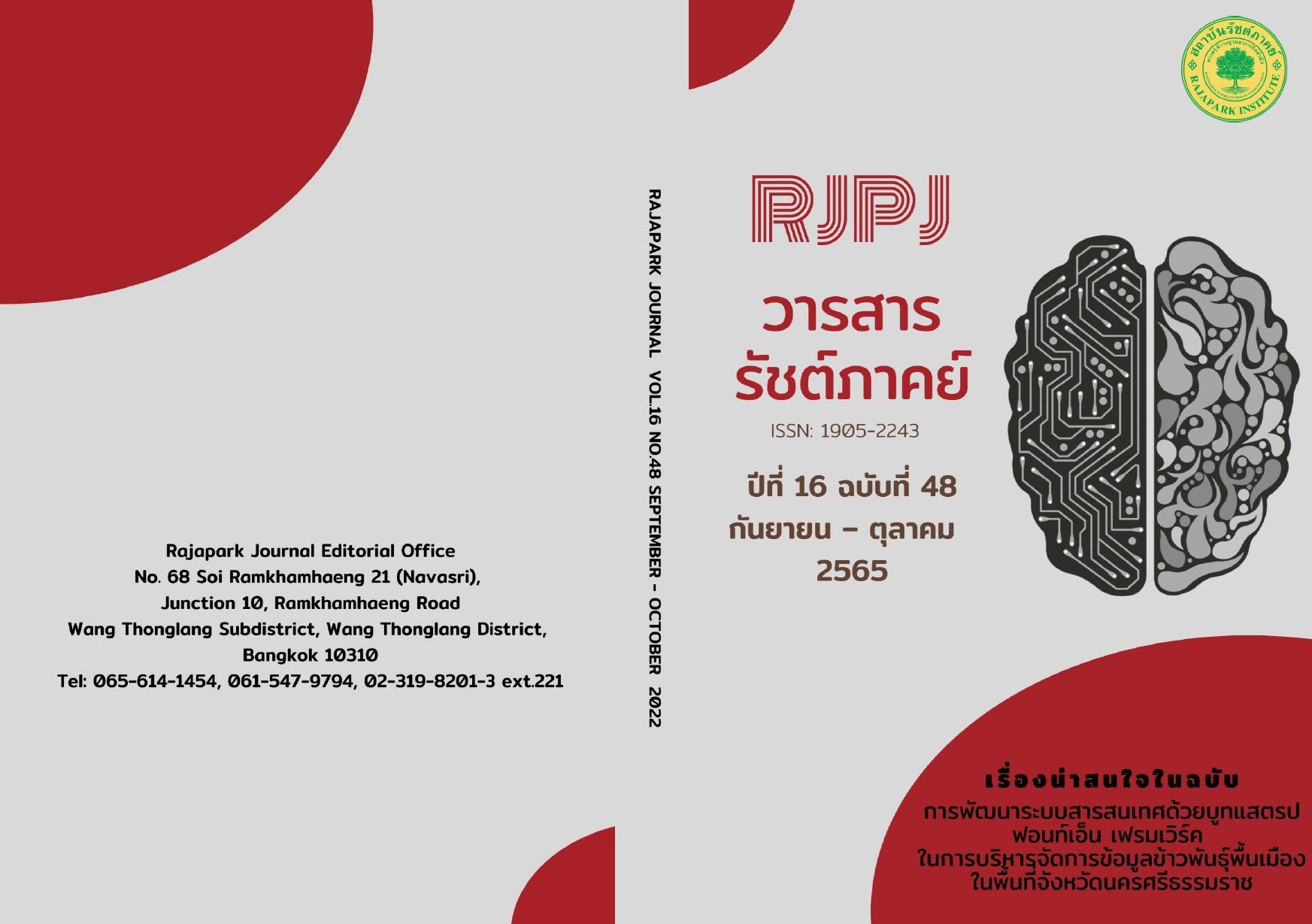Factors Affecting Cultural Intelligence of International Relations Staff of Kasetsart University
Main Article Content
Abstract
The objectives of this research paper are to explore the cultural intelligence of international relations staff of Kasetsart University (KU); to study factors affecting their cultural intelligence; and to examine the relationship between some factors and their cultural intelligence. The sample group consisted of 88 KU staff, whose roles and responsibilities relate to international relations. The data were collected by online questionnaire which Cronbach’s alpha value of each part is more than 0.7, and analyzed by mean, standard deviation, independent t-test, and correlation analysis with significance level of 0.05. The results showed that most of the sampling had a high level of cultural intelligence. The overall results of the study further demonstrated that KU staff expressed significant difference in cultural intelligence, reflecting their significant differences in experience with international travel and frequency of intercultural social contact. But there was no significant difference of cultural intelligence of staff regarding their foreign language skills and level of cross-cultural training. The openness to experience factor and the perceived self-efficacy factor correlated positively with their cultural intelligence. The results of this study can assist the International Affairs Division, Kasetsart University, and administrative offices of the university to formulate policies and carry out activities to promote cultural intelligence of its international relations staff. Furthermore, recommendations for future research can be drawn from this study.
Article Details

This work is licensed under a Creative Commons Attribution-NonCommercial-NoDerivatives 4.0 International License.
Views and opinions appearing in the Journal it is the responsibility of the author of the article, and does not constitute the view and responsibility of the editorial team.
References
Akarabaworn, J. (2012). The study on Human Resource Trends, 2012 (HR Trends 2012). Research Project under School of Human Resource Development, National Institute of Development Administration.
Akaraphun, R. (2020). Contribution of Cultural Intelligence to Job Performance of Domestic Hotel Employees in Thailand: The Mediating Roles of Communication Effectiveness and Job Stress. Thammasat Review, 23(2), 170-191.
Alon, I., Boulanger, M., Elston, J.A., Galanaki, E., Martínez de Ibarreta, C., Meyers, J., Muñiz-Ferrer, M., & Vélez-Calle, A. (2018). Business Cultural Intelligence Quotient: A Five-Country Study. Thunderbird International Business Review, 60, 237-250.
Ang, S., & Dyne, L.V. (2006). Handbook of Cultural Intelligence: Theory, Measurement, and Application. M.E. Sharpe.
Ang, S., Dyne, L.V., & Koh, C. (2006). Personality Correlates of the Four-Factor Model of Cultural Intelligence. Group & Organization Management, 31(1), 100-123.
Ang, S., Dyne, L.V., Koh, C., Ng, K.Y., Templer, K.J., Tay, C., & Chandrasekar, N. A. (2007). Cultural Intelligence: its Measurement and Effects on Cultural Judgment and Decision Making, Cultural Adaptation and Task Performance. Management and Organization Review. 3, 335-371.
Aticomsuwan, S. (2016). The Development of Cultural Intelligence of Undergraduate Students in The Western Region of Thailand. Journal of Business Administration the Association of Private Higher Education Institutions of Thailand, 5(1), 92-104.
Bandura, A. (1977). Self-efficacy: Toward a Unifying Theory of Behavioral Change. Psychological Review, 84, 191-215.
Chamnan, S. (2014). Cultural Intelligence: Human-Understanding Factors for Executives. Journal of Educational Administration Burapa University, 9(1), 1-12.
Cristina, R., Aguilar-Barrientos, S., & Román-Calderón, J. P. (2016). Education-Related Factors in Cultural Intelligence Development: A Colombian Study. Journal of Teaching in International Business, 27(1), 41-58.
DeKeyser, R. M. (2007). Practice in a Second Language: Perspective from Applied Linguistics and cognitive psychology. Cambridge University.
Earley, P.C., & Ang, S. (2003). Cultural Intelligence: Individual Interaction across Culture. Standford Business Books.
Earley, P.C., & Mosakowski, E. (2004). Cultural intelligence. Harvard Business Review, 82(10), 139-146.
Kanfer, R., & Heggestad, E.D. (1997) “Motivation Traits and Skills: A Person-Centered Approach to work Motivation”. Research in Organizational Behavior, 19, 1-56.
Lee, J.J, Crawford, A, Weber, M.R., & Dennison, D. (2018). Antecedents of Cultural Intelligence Among American Hospitality Students: Moderating Effect of Ethnocentrism. Journal of Hospitality & Tourism Education, 30(3), 167-183.
Lee, J.J., Weber, M.R., & Rivera, D.Jr. (2018). A Sociocultural Perspective on Expatriation Willingness: The Mediating Role of Cultural Intelligence. Journal of Hospitality Marketing & Management, 28, 124-145.
Li-Yueh, L., & Sukoco, B.M. (2010). The Effects of Cultural Intelligence on Expatriate Performance: The Moderating Effects of International Experience. The International Journal of Human Resource Management, 21(7), 963-981.
Ployota, T. (2017). Research and Development of Cultural Intelligence in ASEAN Cultural Context for Undergraduate Students[Doctoral Dissertation, Srinakharinwirot University].
Poonphon, P. (2014). The Influence of Cultural Intelligence on Cross-cultural Adaptation and Performance of Migrant Employees in Thailand. Research Science and Intellectual Science, 12(2), 109-121.
Pruitipibultham, O., & Eiadkaew, R. (2013). Documents for the seminar on Cultural Intelligence: WHAT, WHY, AND HOW In stepping into the AEC. Seminar on Personnel Management Day 2013 on the topic “Proud to be HR: Creating your Credibility” by the Personnel Management Association of Thailand Organized on 19-20 November 2013 at Centara Hotel Grand at Central Ladprao.
http://www.pmat.or.th/index.php/news-and-event/news/item/176-hr-day-2013
Srisawat, N. (2017). Psycho-Social Factors Related to the Behavioral Culture Intelligence of Undergraduate Student in the international Curriculum[Master’s Thesis, Srinakharinwirot University].
Tantivetruengdech, P. (2013). The Relationship Between Cultural Intelligence and Performance with the Mediating Effect of Culture Shock: A Case from Myanmar Laborers in Ranong[Master’s Thesis, Kasetsart University].
Thomas, D., & Inkson, K. (2004). Cultural Intelligence: People Skills for Global Business. Berrett Koehler.
Trisri, S. (2018). Cultural Intelligence and Other Factors Affecting the Cultural Intelligence of Undergraduate Students: Mixed Method Research[Doctoral Dissertation, Srinakharinwirot University].
Van Dyne, L., Ang, S., Ng, K. Y., Rockstuhl, T., Tan, M.L., & Koh, C. (2012). Sub‐dimensions of the Four Factor Model of Cultural Intelligence: Expanding the Conceptualization and Measurement of Cultural Intelligence. Social and Personality Psychology Compass, 6(4), 295-313.
Yamane, T. (1973). Statistics: An Introductory Analysis (3rd ed.). Harper and Row.


